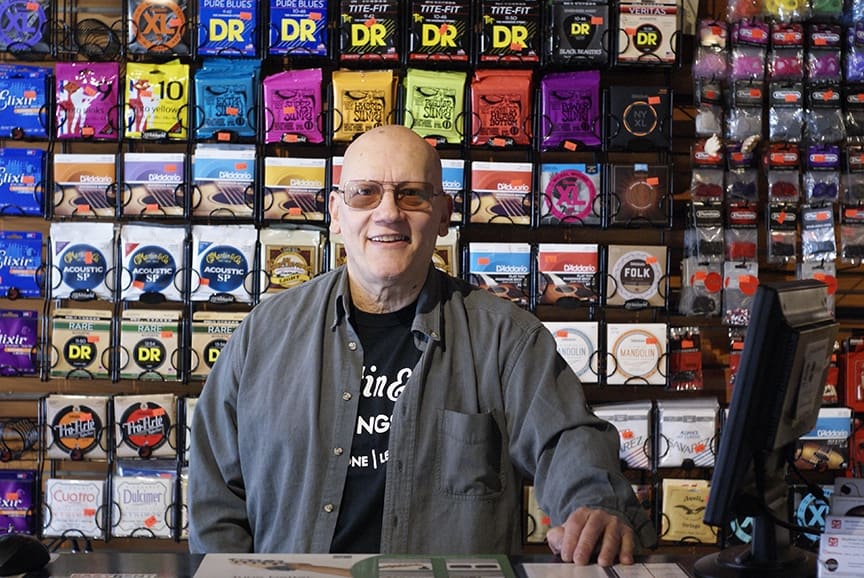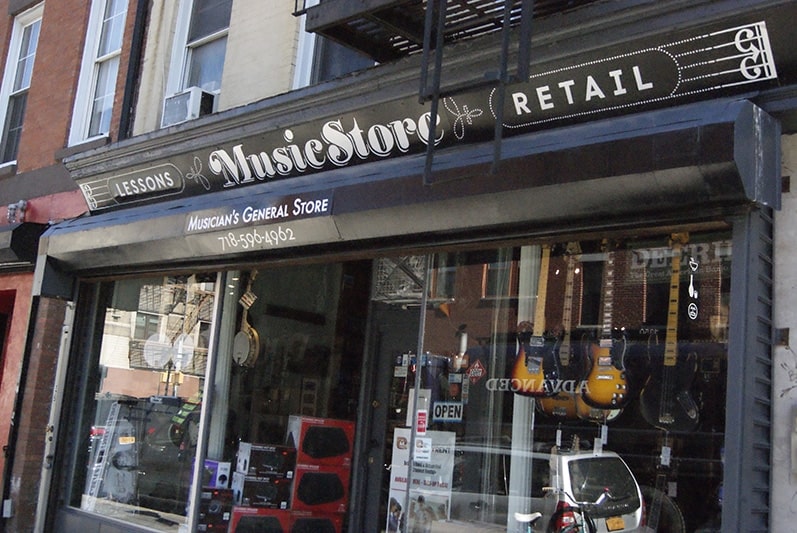
At Wyckoff Street, on the block located between Court and Smith, Mingo Tull spent his early years hanging out with the other kids in the area.
He recalls sitting on the steps of an old brownstone and listening to a late 60’s cover band “The Mudd”, playing out of the home’s living room.
“As everyone was playing stickball, I was sitting in this area, mesmerized by this band,” Mingo remembered. “That’s where I got my start loving music.”
It was at the age of about 12 or 13, sitting on those steps, that Mingo found his passion and decided what he wanted to do in life – make music.
As Mingo grew up, he played bass in various bands and at varying levels of formality.
“I wasn’t the ‘starving artist’ type. I couldn’t do that,” Mingo explained. “I needed something stable as well, so I had to learn to balance business with music.”
Mingo graduated from college with a degree in accounting and went into banking. He switched to driving trucks for UPS when he realized it paid better and for many years, he lived in this way, working for a variety of shipping companies and earning a stable wage.
He balanced his work life with his music life, playing in bands during his spare time.
During these early working years, Mingo’s musical career hit peak success and he found himself sharing stages with Jackson 5, James Brown, and other famous musicians, along with well-known music producers.
He got to know a lot of people. And for a while, he thought his music career would lead to something big.
However, Mingo soon married, which was followed shortly after by the birth of his two children. With too many things going on between work, music, and family, something had to go.
Mingo explained, “I gave up music for a time, but there was this void.”
When he could no longer take it, he decided to pick up his instrument once again and throw himself back into music, but it came at the cost of his marriage.
Since that time, Mingo has stuck with music through everything. In 1991 he met Rosann Natale, and together they found love and a shared desire to open their own store.

Musician’s General Store
With Roseann’s knowledge of business and Mingo’s passion for music, they found a space on Amity Street and opened a music shop on October 23, 1993.
Roseann designed the store in the style of the Old Western notion of a general store, as the pair hoped their shop would become a sort of communal space.
Mingo recalled their first space as being small. Two hundred and fifty square feet small.
“We had to use the bathroom as storage. We couldn’t even use it for its intended purpose, it was so full of merchandise,” Mingo laughed.
So it was no surprise when in 1996, The Musician’s General Store outgrew the little storefront on Amity and had to find a new home on Court Street.
Their new store found great success on Court, so much so that over the next two years, Mingo and Roseann decided to open two more music stores on Court. One focused on orchestral instruments, the second, print music, and the third, guitars, bases, repairs, and lessons.
If running three music stores wasn’t enough, Mingo also found the time to run a production company, Metropolis Productions, play in a corporate events and wedding band, and start a music school, Rock’Scool, out of his shops.
The multiple components of business helped form a delicate balance that kept business lucrative. When the shopping season died down in the summer, the wedding band picked up more work and vice versa.
With three successful shops running smoothly, Mingo and Roseann had the freedom to open a Mediterranean restaurant on nearby Smith Street that they called Rosina’s Bistro.
“That was my dream,” Roseann explained. “I was a pioneer in the neighborhood. People didn’t like Smith Street. It was run down, gated up…”
The restaurant ran well for over two years, but eventually a combination of healthcare struggles and rising rent prices brought their quickly expanding empire tumbling down.
First, the restaurant closed as Roseann found herself getting sicker and sicker, unable to keep up with the pace of business.
“We didn’t have insurance at the time, it was so expensive,” Roseann remembered.
But, without any other options, she bought private insurance the January after the restaurant shut its doors and received treatment.
Then in 2001, when the World Trade Centers collapsed, the streets of Carroll Gardens emptied.
“There were tumbleweeds in the streets for a while,” Mingo joked. “The streets were dead.”
He found that music was not a necessity in the struggling area and business died down as rent prices skyrocketed. Mingo and Roseann tried to keep their stores alive, but it became increasingly difficult.
They closed down one store first and tried to make due with two. But before long, they were down to one.
When their lease ended in 2006, the rent doubled. They closed the shop on October 23, 2006 and Mingo, for the first time in 13 years, had to go work for someone else.
He found himself working at The Guitar Center, a large chain music store that had previously been his biggest competition in the area. It was convenient timing, as Mingo found himself in need of the health insurance that came along with working for a large employer.
It was not a bitter moment. In fact, Mingo remembers that at that point, the pair just needed a break.
“We were exhausted,” Mingo explained. “We got into business late in life. And in the midst of it all, trying to be a parent… We needed to relax a little.”
For 5 years, Mingo worked at the Guitar Center and kept his production company, music school, and wedding band alive on the side. He never considered going back into business until 2011, when everything seemed to fall into place.
One day, Mingo walked into a store on Smith that was having a closing sale. As he knew the people inside, they offered him the chance to lease the space. But Mingo wasn’t prepared to go back into business and declined the offer.
The following day, Brian Whiton, a piano technician that Mingo used to work with, showed up at Guitar Center and asked Mingo if he would be interested in going into business together.
Surprised, Mingo and Roseann put serious thought into the offer. With a partner, it might not be so difficult, they mused.
On October 23, 2011, the Musician’s General Store reopened on Smith Street.
“The date kept repeating itself. It was the day we opened the first store, we reopened on Court, we opened the restaurant, we closed the music shop…” Mingo explained. “So we did it intentionally this time.”
Once again, Mingo found himself juggling his multiple jobs – the retail store, the music school, the production company, and the band…
“You have to love what you do overall,” Mingo explained. “I love music.”
But without the Affordable Care Act, the Musician’s General Store might not be open today.
Healthcare
Mingo has suffered from a series of autoimmune disorders over the years. Most recently, Mingo was diagnosed with Transverse Myelitis, a disease that damages the central nervous system leading to symptoms like pain and paralysis.
“It could have been worse for me, at least I’m walking,” Mingo said. “[The disorder] requires a lot of medication and these medications, some cost $100, $150 each. ”
Without insurance, medications would cost Mingo and Roseann thousands of dollars a month, an amount they would not be able to keep up with.
“Ro and I, we feel it is a right,” Mingo noted. “With education and health care… everyone should have it. It should be a right.”
The couple is fearful of the the Trump administration’s efforts to repeal the Affordable Care Act.
“[The plan] would affect us terribly. We are both going to be 65 soon and Medicare is one of the targets,” Roseann noted, imploring, “Why don’t we work with what we have and try to make it better?”
Mingo added, “The government controls a lot, but the people control more. If they take it away, you will probably see the biggest clash between government and people. Health care, it’s going to be the number one right.”
Mingo recalls that he had to do a lot of different things to ensure that he received the insurance he needed whenever one of his autoimmune disorders would crop up.
“Whenever I needed personally to make sure I had healthcare coverage, I took on other jobs that would help me with insurance,” Mingo recalled.
“You sacrifice quality of life because you’re now putting in 65, 70 hours a week. That’s been my existence for so long.”
In order to make it work, Mingo has had to find a balance between business and music, money and pleasure, healthcare and the joy of being his own boss.]It hasn’t been easy, but overall, he feels pretty lucky.









One Comment
I met Mingo years ago with his band n they rehearsed in my studio all i can say is that he is a very nice guy very talented all around good man he is one of the best people i have crossed paths with in life n theres only a few i can say that about all the best to you my friend thanks for every thing
Nicky Gaggs